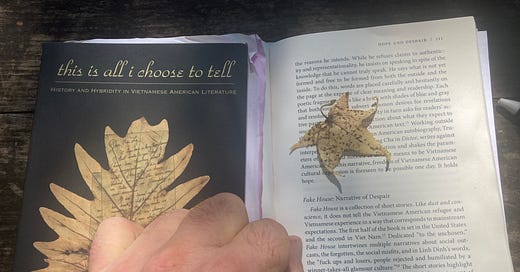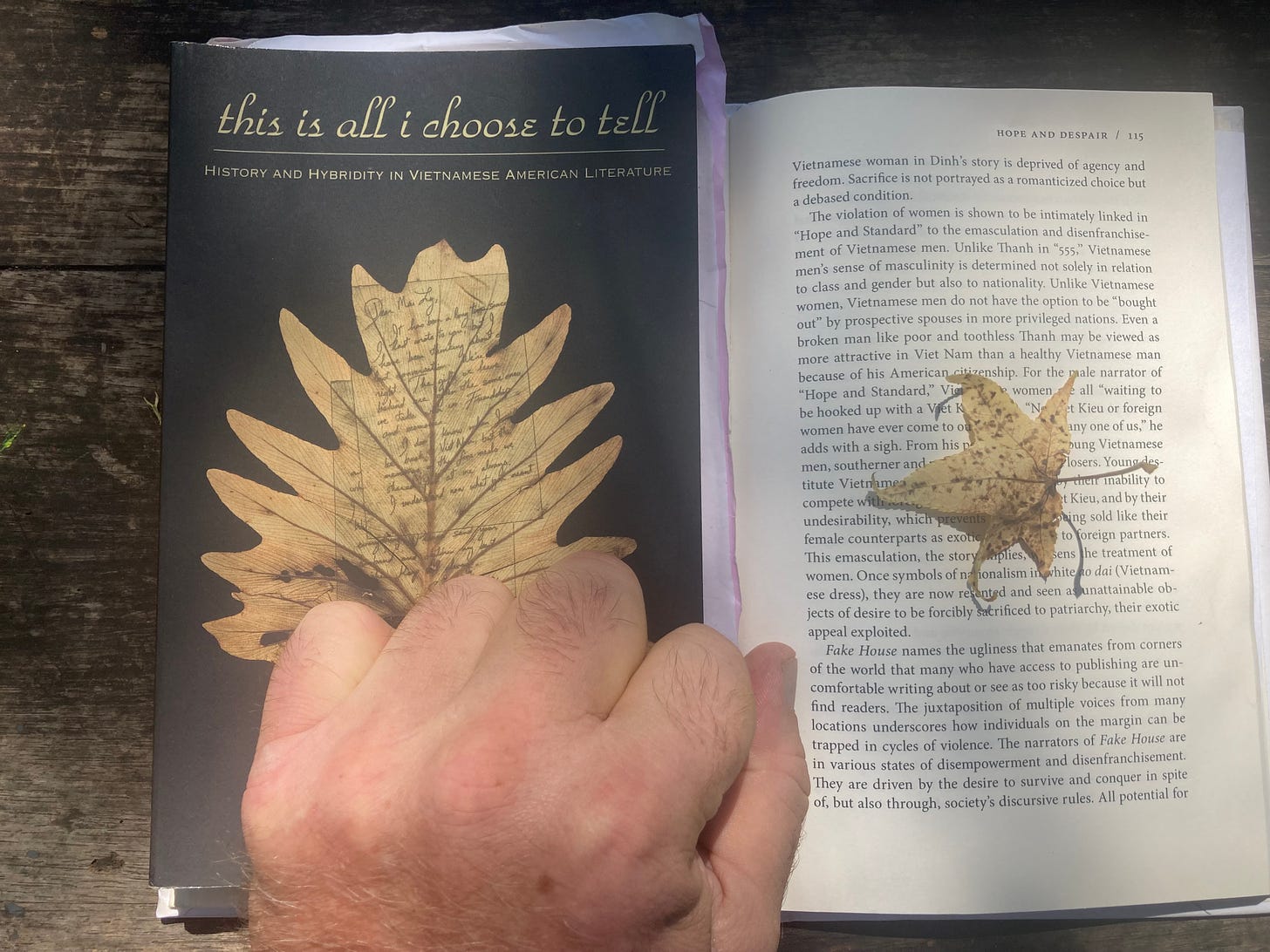This Is All I Choose to Tell: History and Hybridity in Vietnamese American Literature (vi)
from critic Isabelle Thuy Pelaud about the short stories of Linh Dinh
The poet Linh Dinh published his collection of short stories with Dan Simon of Seven Stories Press when I was mapping the Vietnamese and Orientalist books of Paris, France, over the academic year 1999-2000. I wrote about Fake House for my colleagues at the Vietnamese Studies Group, Association for Asian Studies.
I greeted the collection as a demonstration of the artist’s apprenticeship and mastery in the art world of short stories in English in the United States of America. You write them, send them out, find one editor after another who prints one in their journal, then gather the stories with a book publisher who has an eye towards continued collaboration.
Dedicated “to the unchosen,” Fake House intertwines multiple narratives about social outsiders, the forgotten, the social misfits and in Linh Dinh’s words, the “fuck ups and losers, people rejected and humiliated by a winner-takes-all glamour culture.”
Dan had previously worked with Linh to bring out his Night, Again: Contemporary Fiction from Vietnam. The two went on to bring out another collection of Linh’s own stories, Blood and Soap, and his novel Love Like Hate, before Dan published the poet’s monumental ethnography of the poor in the USA, Postcards from the End of America.
The distinctive quality of the Fake House stories that I remarked on at its publication, that has stayed with me, is that in half of them Linh writes in the voice of Americans like him and me who do day labor. Most American fiction goes unremarked as by and about people who work full-time as clerks or on salary as managers or executives.
The short stories highlight problems of alienation, communication, and the attainment of subjecthood by recent Vietnamese immigrants to the United States, indigenous Vietnamese villagers, and marginal white characters.
Linh startled me recently when I looked up his continuing work at his blog. My friend has become a Jew-hater. He rejects that label, to his credit, and indeed I can’t imagine this kind, gregarious man hating anyone face to face. I recall when James Laughlin the publisher of the poet Ezra Pound dismissed to me any suggestion that Ezra was an anti-Semite.
Ezra located the sin of the modern world in usury. You know, Shylock. The poet broadcast from wartime Italy in support of the collapse of civilization across Europe. Even the fascists of Rome thought he was a little crazy about the Jews. In every other public act Ezra was a great guy who in poverty himself would do anything for an artist, among them Jews.
Fake House names the ugliness that emanates from corners of the world that many who have access to publishing are uncomfortable writing about or see as too risky because it will not find readers.
But he stood up against us when it counted. Now Linh has settled on Jews as the cause of COVID, or the agents of the propagation of the virus, or the hoaxers behind it, or a sinister force using public health for world domination. Or something. Look, no anti-Semitism makes any sense.
It is the poor man’s socialism. If you reject the capitalist world and you don’t actually want to go to meetings and do anything about it, you can hate the Jews. In the case of the industrious Linh Dinh, it seems to me that he is exhausted and isolated.
The narrators of Fake House are in various states of disempowerment and disenfranchisement.
His intellect has degraded. I have weathered such passages myself. Anomie is a work hazard of the ethnographer. See the diaries of Bronislaw Malinowski, from a nation that had vanished, living among another doomed people. You may read Bron nutting out in the diaries his widow published.
He scribbles hatred for the n*****s he studies who have sustained and tolerated him. Bron went on of course to became a bishop and pope of anthropology, teaching respect for the adaptations each people makes to life. A communicant and evangelist of Bron’s church as well as a Jew I live in hope that my friend, the poet, will come out the other end of this.
They are driven by the desire to survive and conquer in spite of, but also through, society’s discursive rules.
Not an anthropologist, not a Jew, the literary critic Isabelle Thuy Pelaud read our friend’s stories much better than I when they came out. Where I rejoiced in his recognition of my life world, Isabelle spotted the despair. She has turned out to be right. Perhaps I will be too.
This is the sixth Viet Nam letter of 6 so far addressing This is All I Choose to Tell by Isabelle Thuy Pelaud. The first posted on April 11, 2022, the second on May 11, 2022, the third on June 15, 2022, the fourth on September 5, 2022, and the fifth on October 19, 2022.
Viet Nam letters have addressed the poet Linh Dinh’s book Postcards from the End of America 4 times. First on June 11, 2022, second on August 6, 2022, third on August 22, 2022, and fourth on May 11, 2023.
We further addressed the poet in the first post of 1 so far titled 13 Ways of Looking at a Jew Hater, on April 29, 2023.
Viet Nam letters respects the property of others under paragraph 107 of United States Code Title 17. If we asked for permission it wouldn’t be criticism. We explain our fair use at length in the letter of September 12, 2022.
The colophon of these Viet Nam letters, directly above, shows the janitor speaking with poet David A. Willson on a Veterans Day.








This is the writing I’ve been praying 🙏/dreaming of reading for 50 years. I thought you’d already finished your great Viet Nam War novel when you were in high school. Now I see you were just warming up.